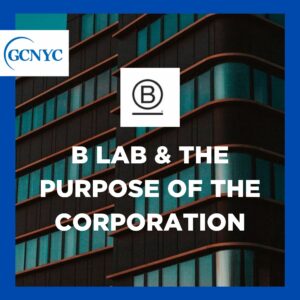
INTRODUCTION
The institutionalization of shareholder primacy through short-term stock incentives for executives has geared corporate action towards short-term financial results which has resulted in devastating negative externalities to the planet and people. It is time that companies reengineer their vision and focus.
B Lab is a systemic change-oriented, non-profit which certifies companies as B Corporations based on a series of measurements and considerations. It is working towards bringing about behavioral, cultural, and structural improvements in the way business is done.
In the book “Better Business: How the B Corp Movement Is Remaking Capitalism”, Christopher Marquis (Cambridge University) argues that the chief contribution of the B Corp certification has been the process itself. By undergoing the certification process businesses are put on a path to look carefully at their impacts on society and environment more broadly this also prepares them to be more future-proof and resilient in challenging arenas like climate change, delivering commitments to diversity, equity, and inclusion.
THE STRUCTURAL CHANGE ELEMENT
B Lab was fundamental in developing benefit corporation legislation, stressing the fact that the fiduciary accountability of a corporation extends beyond just the shareholders, and encompasses all stakeholders of the business.
There are over 500 certified B Corps today, across 150 industries spanning over 80 countries. These are the businesses that are leading by example for reaching an economic system that is truly inclusive, equitable, and regenerative.
“B-Corp certification is to a business what fair trade is to a package of coffee or LEED certification is to a building” – Charlie Fraioli
HOW DOES A COMPANY BECOME CERTIFIED?
There are three categories of requirements –
1. Performance Requirement: demonstrated performance of positive impact as well as minimizing the negative impact. This requirement is the crux of what makes a B Corp.
The positive impact is assessed through the B Impact Assessment tool, negative impacts are factored in through a risk review process that is specifically designed for the company’s industry. The verification processes include interviews, documentation reviews, virtual and onsite reviews, etc.
Learn more about the B Impact Assessment structure and B Impact Assessment Scoring through B Lab’s official website.
“A lot of companies do tend to overestimate their positive impact….in order to embrace the cultural shift, business leaders need to embrace criticism and take accountability….a lot of review calls and conversations are met with defensiveness..” – Charlie Fraioli
2. Legal Requirements: the company must be legally chartered to recognize its accountability to all stakeholders. This requirement can be satisfied in different ways depending on the company’s jurisdiction.
3. Transparency Requirement: scores on assessments should be made public on the organization’s B Corp profile.
Additional requirements or prohibited practices for the company depend upon the
industry.
STAKEHOLDER RIGHTS
Any stakeholder can issue a complaint against a certified B Corp on one of two grounds if the company has intentionally misrepresented its claims of impact or has violated agreements/ principles which are a part of being a B Corp. The complaint will be reviewed for its specificity and credibility, after which a formal investigation is launched which is elevated to the Independent Standards Advisory Council. The council determines whether the business should take corrective measures or the certification should be revoked.
USING BIG DATA AT B LAB
The impact assessment tools make use of questions that companies interested in certifying as a B Corp should answer. Even the answers provided by companies that do not reach the 80-point threshold (after evaluation) necessary for certification are also considered useful data. This data is then used to analyze and understand the social and environmental performances of the B Corp community.
“B Corps are 94% more likely to offer part-time employees with health care in comparison to ordinary businesses….they are also 68% more likely to use majority renewable energy” – Michele Bradley
The growing interest for a sustainable shift in the business realm is gaining traction due to public awareness and demand for social justice, and as we face the intensifying negatives of climate change. B Corporations are the future of how businesses would be expected to perform.
B Lab’s “knowledge base” can be referred to find answers to any pressing questions, browse the existing questions database or open a ticket and ask something new.
Refer to GCNYC’s full seminar for a more in-depth understanding of the B Corp Certification!!

